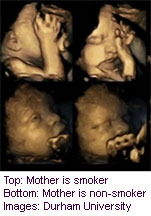- Gelatin vs. Collagen: Which is Best for Skin, Nails, and Joints?
- The Long-Term Effects of Daily Turmeric Supplements on Liver Health
- Could Your Grocery Store Meat Be Causing Recurring UTIs?
- Are You Making This Expensive Thermostat Error This Winter?
- Recognizing the Signs of Hypothyroidism
- 10 Strategies to Overcome Insomnia
- Could Artificial Sweeteners Be Aging the Brain Faster?
- Techniques for Soothing Your Nervous System
- Does the Water in Your House Smell Funny? Here’s Why
- Can a Daily Dose of Apple Cider Vinegar Actually Aid Weight Loss?
Fetal Faces Seem to React to Mom’s Smoking


In a new study, 4-D scans of fetal faces showed differences in expression between those carried by women who smoked versus those carried by women who didn’t.
The British researchers believe the differences in fetal facial movements may point to the harm caused by smoking during pregnancy.
“Technology means we can now see what was previously hidden, revealing how smoking affects the development of the fetus in ways we did not realize,” study co-author Brian Francis said in a Durham University news release.
“This is yet further evidence of the negative effects of smoking in pregnancy,” said Francis, a professor in the department of math and statistics at Lancaster University in the U.K.
In the study, the researchers conducted 4-D ultrasound scans of 20 fetuses at four different times between 24 and 36 weeks of pregnancy. Four of the moms-to-be smoked an average of 14 cigarettes per day, while the others were nonsmokers.
The scans showed that fetuses whose mothers were smokers had much higher rates of mouth movement than those whose mothers did not smoke.
The scans also showed that fetuses whose mothers smoked took longer to reduce their frequency of facial touching, compared to fetuses whose mothers did not smoke.
This might be because smoking during pregnancy affects the development of the fetal central nervous system, according to the authors of the study, which was published online recently in the journal Acta Paediatrica.
All of the babies were born healthy, the researchers noted.
Like prior research, this study found that stress and depression in pregnant women also had a significant impact on fetal movements. But even among pregnant women with stress and/or depression, mouth and touch movements were higher among fetuses whose mothers smoked, the researchers report.
“A larger study is needed to confirm these results and to investigate specific effects, including the interaction of maternal stress and smoking,” study author Nadja Reissland, of the department of psychology at Durham University, said in the news release.
Still, “these results point to the fact that nicotine exposure per se has an effect on fetal development over and above the effects of stress and depression,” she said.
More information
The March of Dimes has more about smoking during pregnancy.
Source: HealthDay
Copyright © 2026 HealthDay. All rights reserved.










